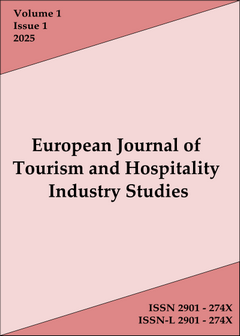European Journal of Tourism and Hospitality Industry Studies is an international peer-reviewed publication that presents high-quality, original, and recent research focused on a wide range of thematic areas within the tourism and hospitality sectors. The journal explores both traditional and emerging topics, examining and comparing industry practices, policies, trends, innovations, and development programs from diverse countries and cultural perspectives. Authors are strongly encouraged to employ a variety of theoretical and methodological tools in order to gain new insights by integrating different perspectives, social and cultural contexts, psychological aspects, alternative theories, and techniques. Interdisciplinary and cross-cultural approaches are especially welcome, as the journal seeks to foster a deeper understanding of the global tourism and hospitality landscape through diverse academic contributions. European Journal of Tourism and Hospitality Industry Studies is published biannually in an open-access online format, with full texts available in English, Spanish, Portuguese, and Italian. The journal welcomes a broad spectrum of scholarly contributions, including original research articles, theoretical papers, communications, intervention studies, case studies, book reviews, commentaries, and short reports. All submissions undergo a rigorous peer-review process to ensure academic quality and relevance. Printed editions of the journal are available upon request for institutions and/or individuals. Manuscripts may be submitted through the official submission form or via email at submit@oapub.org, with authors kindly requested to indicate the preferred journal in their correspondence.
Vol 1, No 1 (2025)

Table of Contents
Articles
|
Elias Tadesse Abate, Gebre Dawit Tefera, Selamawit Habtamu Assefa, Meseret Biruk Girma
|
|
|
Elias Tadesse Abate, Gebre Dawit Tefera
|
|
|
Desta Dawit Kebede, Meseret Biruk Girma, Gebre Dawit Tefera
|
|
|
Abebech Alemneh, Desta Dawit Kebede, Negedae Selamneh Laekeslase
|
|
|
Lamesgn Feqade Silase, Timotaewos Semae Neh
|
|



